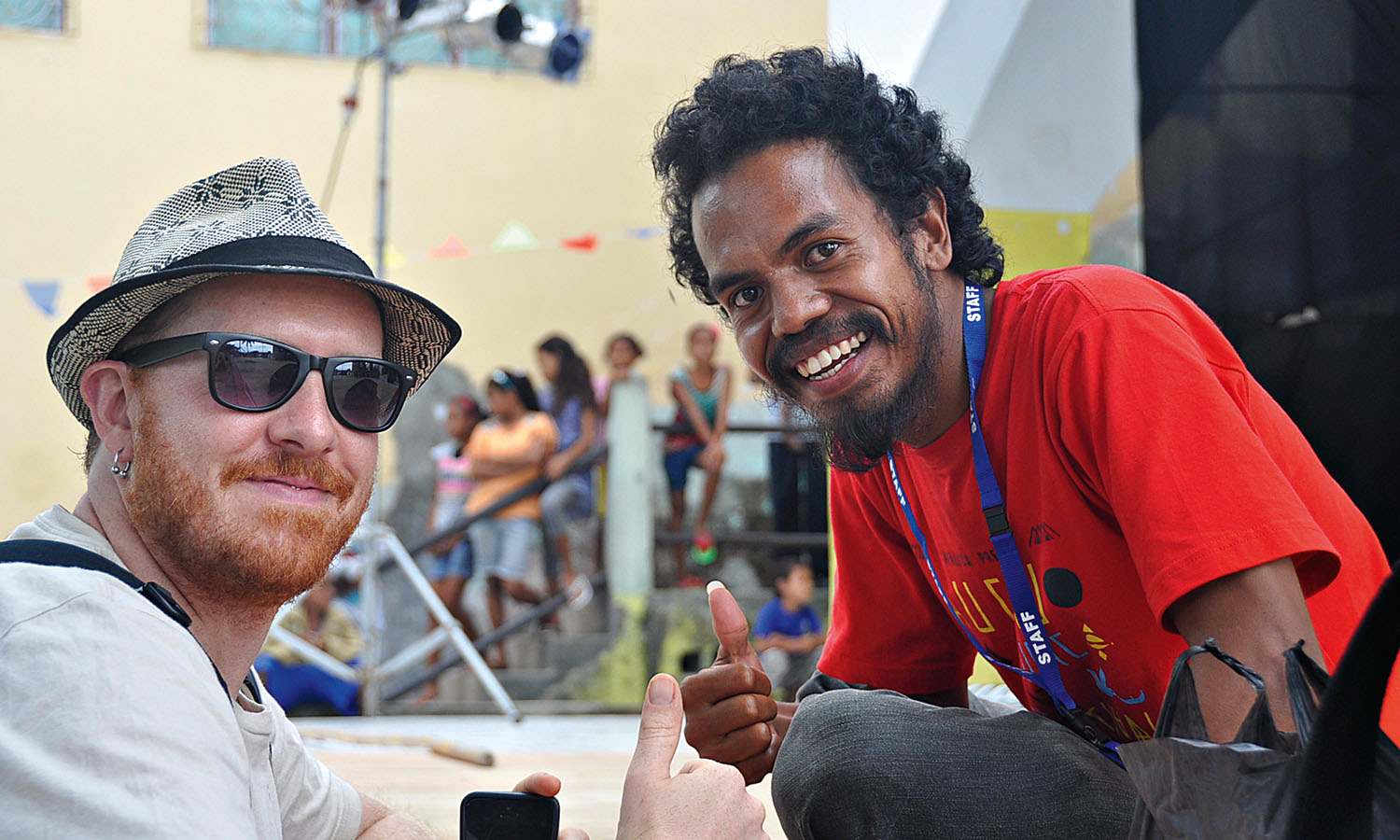
It starts quietly enough. Men playing an assortment of instruments – guitars, a violin, mandolin and bongos – are picking out a tune. Then a group of teenage girls starts singing, their voices transforming the music into something magical. “That’s a song about asking people to come back to your land,” says one of the men through a translator when the song is done. “A song that became popular after the independence vote.”
These are some of the local musicians in a small Timor-Leste village called Uai Gae, and the microphones they’ve been playing to on the patio of a small building have been placed their by Melbourne musician, songwriter and educator Jesse Hooper. In August 2013, Hooper, with the help of sponsors and money raised from a Pozible campaign, went to the island nation to explore its music and witness the country’s first-ever music and culture festival in Baucau.
“When I was there I spent most of my time looking at traditional music with the villagers, which was great, but at the festival they had much more modern rock music,” says the former Killing Heidi guitarist. “It was great – people wanted to rock out, they wanted to dance, they’d never seen a PA or big light rigs. From an audience perspective it was fantastic.”
While he was there, Hooper discovered a musical thread that seemed to connect the villagers, who often sing of independence, nation building and community, and a younger generation who are influenced by contemporary genres. One of the groups he met is called Galaxy.
“Galaxy fuse reggae and rock and are much more political about Timorese issues,” he explains. “That’s what excites me because it’s unique to that area and these are their stories. That’s what I’m curious about. In Dili, there are lots of youths, there are gangs, there’s massive unemployment and there’s tension building because what are they going to do? The guys in these bands are trying to provide some leadership through music to say it’s a new country, things are going to get better, let’s not forget our roots. That’s what I’d like to go back and explore.”
It’s not entirely surprising that Hooper was interested in their work, since Galaxy’s music has a definite synergy with his ‘day job’: one day a week he teaches at Melbourne music school Collarts, but he’s also a community cultural development artist at Artful Dodgers Studio, part of Jesuit Social Services in the suburb of Collingwood. There, he’s part of a team of professional musicians and artists that provides a creative outlet for refugees, asylum seekers and young people with mental health, alcohol or drug issues and other employment barriers.
Hooper’s connections with Timor-Leste go back some way. In 2001, he and sister Ella played there for the peacekeeping forces. On his return 12 years later, he noticed some big changes. “I remember going through Dili and most buildings were damaged or destroyed, but this time everything was rebuilt,” he says. “But when you go out to Baucau, the roads just drop away to nothing, there’s very little infrastructure and you can’t get phone or internet coverage most of the time.”
After returning from this latest trip, Hooper set about mixing the music he’d recorded. It’s now been delivered back to the people who originally made it. “I left some recording equipment there, but a lot of the people we met in the villages live in their own community and don’t really want to go to someone’s house to use the gear,” he says. “To get them the recordings was one of the main parts of the project and now they’ve got them and MP3 players and ways of listening to them.”
Now, Hooper’s working on the second phase of his grand scheme: to build a permanent recording studio for the musicians. Someone in Baucau has donated a plot of land, other groups have offered to design the facilities and people are helping with all-important fundraising to make it happen.
There’s another Timor connection at Artful Dodgers, through Hooper’s co-worker Paulie Stewart. Paulie’s brother Tony was one of the five journalists executed by Indonesian forces at Balibo in 1975. A member of seminal Melbourne rockers Painters and Dockers, Paulie now plays with the Dili Allstars (a Melbourne-based Australian and East Timorese reggae/ska band) and is a fierce supporter of Timor-Leste, as well as many other great causes.
“He’s got a lot of great connections in Timor,” says Hooper. “He and I have been thinking we’d love to take some young musicians from here to there to do a series of recordings and concerts, but also to bring Galaxy out here and share our audiences.”

